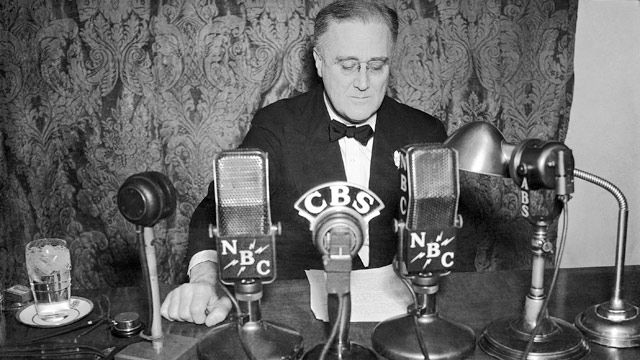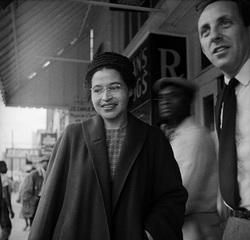When former FCC Commissioner Michael Copps stopped by our offices a couple of weeks ago to talk about possible FCC plans to further relax media ownership rules in major media markets, we got to talking about the broadcast media’s responsibility to the American public. The people own the airways, after all, and we wondered whether there had ever been a “golden age” at the FCC when the public’s interests were truly championed.
Copps mentioned the Blue Book, a set of guidelines the FCC released – and later disavowed – during the 1940s, when the commission experienced a short-lived period of progressive activism. Victor Pickard, an assistant professor at the University of Pennsylvania’s Annenberg School for Communication, has researched and written about the battle over the Blue Book, when broadcasters used red-baiting scare tactics to prejudice the public against the report’s proposed guidelines.
Theresa Riley: Most people have never heard of the Blue Book. What was it and why should we care about it today?
Victor Pickard: The Blue Book (so named because of its blue cover) was a controversial report published by the FCC in 1946. Officially titled the “Public Service Responsibility of Broadcast Licensees,” it defined substantive programming guidelines for judging radio broadcasters’ performance at renewal time and was the FCC’s first significant effort to clarify its public interest standard.This history is significant because, despite narratives to the contrary, the term “public interest” hasn’t been left undefined by a lack of effort or because it’s inherently indefinable; it has remained ambiguous because media industries, particularly commercial broadcasters, have fought aggressively to keep standards — and methods to enforce them — vague and ineffectual.
These earlier policy battles hold much contemporary relevance because many of the challenges that initiatives like the Blue Book tried to address — an over-commercialized and concentrated media system, broadcasters who felt entitled to the public airwaves but often shirked their public service commitments to local communities, etc. — are still troubling us today.
Riley: How did the Blue Book come about?
Pickard: The Blue Book was inspired by the escalating public criticism of radio’s over-commercialization. It also represented, in part, a strategic pivot by progressive regulators and media reform activists. After earlier structural interventions to reform the commercial radio system — like breaking up radio chains and preventing newspapers from buying up stations — were stymied, the FCC hoped to bring about better radio programming by implementing strong public service requirements. It was assumed that if a broadcaster did not comply it would lose its license (a regulatory move that’s virtually unthinkable today).
Riley: What types of programming did the Blue Book define as fulfilling broadcasters’ public service obligations?
Pickard: The Blue Book outlined four requirements for broadcasters: they must sustain experimental programs that were not sponsored by advertisers, promote local live programs, devote programs to the discussion of local public issues and eliminate excessive advertising. Failing to meet these criteria would subject broadcasters to public hearings and possible termination of their licenses.
Riley: Who was responsible for its creation – and what happened to those commissioners?
Pickard: Clifford Durr was the leading progressive on the FCC during the mid-to-late 1940s. When FDR appointed him to the FCC in 1941, Durr became part of a progressive bloc of commissioners that included the FCC Chairman James Lawrence Fly. They also were aided by key staffers like the FCC’s first chief economist, Dallas Smythe, and by outside policy experts like the British-born Charles Siepmann, who had early BBC experience.
Previous historians have observed that the New Deal arrived late and stayed longer at the FCC compared to other regulatory agencies. Although Fly left in late 1944, the FCC remained a liberal stronghold for several more years even as the New Deal agenda faltered elsewhere. Durr was the driving force behind the Blue Book, as well as a number of other progressive initiatives, especially around educational broadcasting. Increasingly, though, he became known as “Durr the dissenter” as his progressive positions became isolated at the FCC. After leaving the FCC, Durr became an important figure in the civil rights movement – he and his wife helped bail out Rosa Parks and he played a key role in her historic court case by providing essential pro bono legal assistance.Riley: What was the reaction to the Blue Book? What was the Red Book?
Pickard: To say that commercial broadcasters viciously attacked the Blue Book before it was even released would be an understatement. Judging from positions taken by the National Association of Broadcasters (NAB), many broadcasters saw the Blue Book as a mortal enemy. Much of their counterattack centered on red-baiting. According to the FCC chairman, the president of the NAB called the Blue Book authors ‘stooges for Communists’, ‘obfuscators’, ‘professional appeasers’ and ‘astigmatic perverts.’ The magazine Broadcasting, the radio industry’s leading trade publication, suggested that the FCC aimed to “BBC-ize American broadcasting.” Following the Blue Book’s publication, Broadcasting’s editorials attacked it for 15 consecutive weeks, accusing the FCC of censoring radio while advancing a communist or fascist agenda. Many of these editorials were later compiled by NBC president Niles Trammel in a red-covered booklet that, cleverly, became known as “The Red Book.”

Riley: Did anything positive come out of the Blue Book era or did it have no effect on broadcasters?
Pickard: There’s room for debate on this question. Overall, the Blue Book didn’t have a significant impact on radio programming, but there were some subtle lasting effects. It certainly sensitized broadcasters to be more mindful of their performance with regards to public interest programming. There was anecdotal evidence that some broadcasters began including more public affairs programming, especially radio documentaries. And the late Norman Corwin, American radio’s “poet laureate,” went so far as to say that he owes much of his career to the Blue Book.
Riley: What lessons can media activists today learn from what happened to the Blue Book?
Pickard: I think there are at least three basic lessons we can draw from the Blue Book episode. First and foremost, we learn that our media system didn’t have to be this way. If policy initiatives like the Blue Book had been given fair consideration we’d likely have a different media system today, one based more on public service and less on commercialism.
Second, we learn that it’s imperative to maintain a strong inside/outside strategy that keeps regulators connected to the grassroots (and not only to corporate lobbyists). Had the Blue Book authors coordinated more with community activists, they may have been able to better withstand the ensuing onslaught.
Finally, we learn that media activists retreat on structural reform at their own peril. Postwar media reformers faced many difficulties beyond their control, but their defeat also came about in part due to their failure to maintain a structural critique of the commercial media system. This critique recognizes that, short of public ownership, the most effective safeguard against irresponsible media is a combination of strong government regulation at the federal level, and local control and oversight at the community level.
In light of the current struggle to prevent an overly commercial and concentrated media system from becoming even more so, it’s instructive to recall a time when the FCC fought to bolster public interest safeguards instead of throwing them out.
Victor Pickard is an assistant professor in the Annenberg School for Communication at the University of Pennsylvania. With Robert McChesney, he is the co-editor of the book Will the Last Reporter Please Turn out the Lights (The New Press). Currently he is finishing a book on the history and future of news media.



